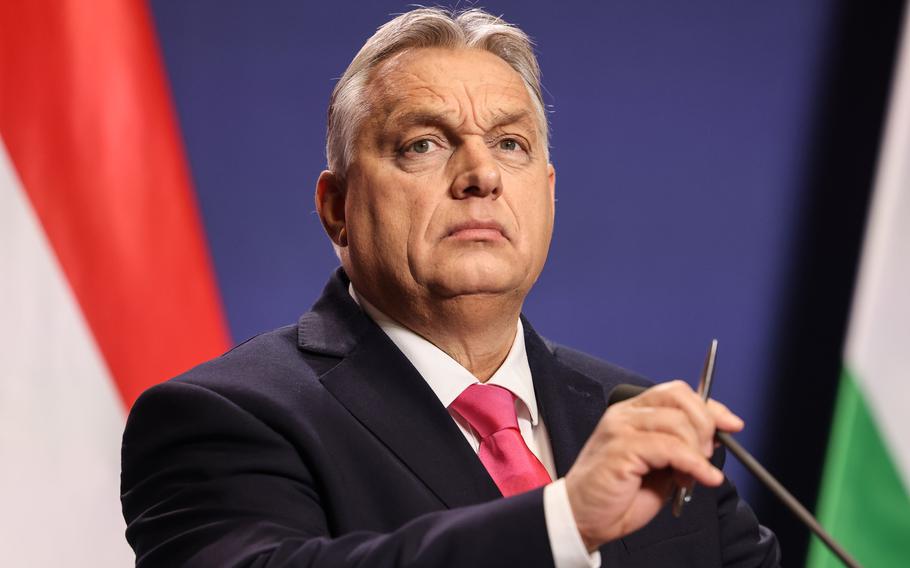
Hungarian Prime Minister Viktor Orban is looking to move past one of the biggest crises of his 14-year rule. (Akos Stiller/Bloomberg)
Hungarian Prime Minister Viktor Orban will look to move past one of the biggest crises of his 14-year rule after the shock resignation of the country’s head of state over a child sex-abuse case exposed cracks inside his well-oiled political machine.
President Katalin Novak resigned as president on Saturday over a pardon she granted in a pedophilia case, which threatened to weigh on the ruling party’s campaign in local and European Parliament elections in June. Judit Varga, who was slated to helm the European campaign of Orban’s Fidesz party and who signed off on the pardon as justice minister last year, also stepped down.
Orban’s hopes for turning the page faced headwinds after Varga’s ex-husband said in a Sunday night interview that the two prominent female leaders were effectively sacrificed to salvage the ruling party’s popularity. Peter Magyar, a former state company executive, also lashed out at the Orban government for alleged intimidation tactics and corruption.
The interview, on the Partizan Youtube channel, was watched by more than half a million people in less than a day.
The rare criticism from a figure close to Orban’s inner circle “suggests there’s real infighting inside the elite and this may cause uncertainties inside the halls of power,” said Peter Kreko, head of Political Capital, a Budapest-based think tank. Orban may nonetheless escape largely unscathed, with limited negative effect at the polls, if voters deem that he moved swiftly to contain the fallout, he said.
Spokespeople for the Hungarian government didn’t immediately reply to emails and calls seeking comment about Magyar’s allegations as well as Novak and Varga’s resignations.
Public opinion
Orban’s Fidesz party is by far the most popular political group in Hungary and the nationalist prime minister maintains a tight grip on power. But the ruling party began to gauge the scandal’s impact before this year’s ballots, in which Orban is moving to secure control of the opposition’s last strongholds, such as the capital Budapest, and to demonstrate his strength as one of the leaders of Europe’s resurgent far-right movement.
Orban, who leads an all-male cabinet, hasn’t made a statement since the resignation. Two days earlier, he had sought to limit the damage from the case by filing a constitutional amendment to prevent the president from issuing pardons for crimes against children.
The premier is due to hold his annual state-of-the-nation speech on Saturday, where he may chart the political outlook and may use the occasion to nominate a successor to Novak. Parliamentary approval is a formality, given that Orban’s lawmakers hold more than two-thirds of the seats, enough to pass any legislation or appointment.
The scandal comes at a sensitive time for Orban, whose relations are fraught with Hungary’s partners inside the European Union and the North Atlantic Treaty Organization due to his cozy relationship with Russia and China and his attempts at undermining Western support for Ukraine.
Orban earlier this month was forced to drop his opposition to an EU aid package for Kyiv, two months after reversing course on a pledge to block Ukraine’s EU membership. He may also open the door for parliament to approve Sweden’s NATO membership later this month, after more than a year-and-a-half of foot-dragging had left Hungary as the lone holdout on ratification.
More stories like this are available on bloomberg.com
©2024 Bloomberg L.P.